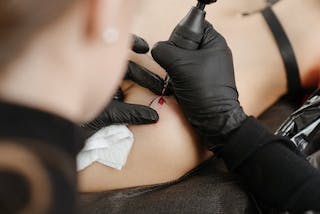Prevent Ring Worm Disease Through Hygiene
Ringworm is a highly contagious fungal infection caused by dermatophytes, a type of fungus that thrives on keratin, a protein found in skin, hair, and nails. Despite its name, it has nothing to do with worms. The infection typically manifests as a red, itchy, ring-shaped rash with raised edges. Although ringworm is usually not dangerous, it can be uncomfortable, unsightly, and persistent if not properly managed. The good news is that practicing effective hygiene can significantly reduce the risk of contracting ringworm. In this article, we we will explore essential hygiene practices to prevent ringworm and help protect your skin, scalp, and nails from fungal infections.
Ring worm disease and its spread
Ring worm disease is caused by dermatophytes, fungi that live on dead skin, hair, and nails. These fungi thrive in warm, moist environments, and they spread through direct skin-to-skin contact or by coming into contact with contaminated objects, such as towels, clothing, and shared surfaces like gym equipment.
The infection can occur in various areas of the body, including the skin, scalp, feet, groin, and nails. Understanding how ringworm spreads can guide you in adopting hygiene practices that significantly reduce the risk of infection.
Hygiene practices
1) Frequent handwashing
The simplest and most effective way to prevent the spread of ringworm is by practicing good hand hygiene. Washing your hands regularly with soap and water helps eliminate any fungal spores that may have been picked up from touching contaminated surfaces, pets, or an infected person.
-
-
- When to wash your hands: Wash your hands before eating, after using the bathroom, after touching animals or other people, and after coming into contact with shared surfaces like gym equipment, public bathrooms, or door handles.
- Proper handwashing technique: Scrub your hands for at least 20 seconds, paying attention to your fingernails, between your fingers, and under your wrists. Use an alcohol-based hand sanitiser when soap and water are not available.
-
2) Shower after physical activities
Sweat creates a moist environment on your skin, which is a perfect breeding ground for fungi. After physical activities, such as exercising, hiking, or swimming, it’s crucial to shower as soon as possible to remove sweat and potential fungal spores from your skin.
-
-
- Use an antifungal body wash: Consider using an antifungal body wash that contains ingredients like ketoconazole or tea tree oil. These can help prevent fungal infections on areas prone to sweat, such as the feet, groin, and underarms.
- Shower with clean towels: Always dry your skin thoroughly after showering, especially in areas where sweat tends to accumulate, such as between your toes, underarms, and the groin area.
-
3) Keep your skin clean and dry
Fungi thrive in warm, moist environments. Keeping your skin clean and dry is crucial to preventing ringworm, especially in areas prone to sweating or friction. Pay close attention to areas like your feet, groin, and armpits, which are often warm and damp.
-
-
- Use breathable clothing: Wear loose-fitting, moisture-wicking clothing that allows your skin to breathe. Avoid tight clothing or fabrics that trap sweat against the skin.
- Dry yourself thoroughly: After a shower, make sure to dry your skin thoroughly, especially between your toes and other skin folds. Use a clean towel each time.
- Use foot powder: If you’re prone to sweaty feet, using an antifungal foot powder or talcum powder can help keep your feet dry and reduce the risk of athlete’s foot.
-
4) Avoid sharing personal items
Ringworm can be spread easily through direct contact or by sharing personal items that come into contact with the skin. This includes items like towels, combs, brushes, razors, and even shoes or socks. Sharing these items increases the likelihood of transferring fungal spores from one person to another.
-
-
- Do not share towels or clothing: Always use your own towels, socks, and clothes, especially in shared spaces like gyms or dormitories.
- Avoid sharing combs and hair accessories: Sharing combs, brushes, and other hair accessories can lead to scalp ringworm. If you do use shared equipment, make sure it is disinfected after each use.
- Personalise your gym gear: Use your own yoga mats, towels, and water bottles when working out in public spaces. If you must use shared equipment, wipe it down thoroughly before and after use with disinfectant wipes.
-
5) Disinfect common areas and surfaces
Since ringworm spores can survive on surfaces for extended periods, cleaning and disinfecting shared spaces is essential in preventing the spread of the infection. Fungi can survive on gym equipment, bathroom floors, and other communal surfaces for hours or even days, making regular cleaning a crucial step in prevention.
-
-
- Disinfect gym equipment: Before and after using shared gym equipment, wipe it down with disinfectant wipes or sprays to remove any fungal spores.
- Clean bathroom surfaces: Regularly disinfect high-touch areas like faucets, shower heads, and toilet handles. Public bathrooms, especially locker rooms and swimming pools, are common places where ringworm can spread.
- Wash linens and bedding regularly: If someone in your household has ringworm, wash towels, sheets, and pillowcases frequently in hot water. Dry them thoroughly in a hot dryer, as this will kill any remaining fungal spores.
-
6) Wear protective footwear in public areas
Ringworm of the feet, also known as athlete’s foot, is commonly contracted from walking barefoot in public areas such as swimming pools, locker rooms, and showers. To prevent fungal infections, always wear protective footwear in these environments.
-
-
- Flip-flops or shower shoes: Wear flip-flops or dedicated shower shoes to protect your feet from coming into contact with potentially contaminated surfaces in public showers, swimming pools, and locker rooms.
- Keep feet dry: After being in public areas, dry your feet completely and change into clean socks and shoes.
-
7) Keep pets clean and check for infections
Pets, especially cats and dogs, can carry the ringworm fungus and pass it on to humans through direct contact. Regular grooming and veterinary check-ups can help ensure that your pet remains free from fungal infections. If you notice signs of ringworm on your pet, such as hair loss, red or scaly patches, or itching, take them to a vet for treatment immediately.
-
-
- Regular baths for pets: Regularly bathe and groom your pets, especially if they spend time outdoors or around other animals. This can help prevent the spread of fungal infections.
- Examine your pet’s skin: If you notice any unusual hair loss, rashes, or scaly patches on your pet, seek veterinary attention immediately. Pets can carry the fungus and infect humans, especially children who may play closely with animals.
-
8) Use antifungal products when necessary
In some cases, using antifungal creams or powders as a preventive measure can be helpful, particularly if you are prone to fungal infections or spend a lot of time in environments where ringworm is common. These products help keep fungal spores at bay, especially in areas prone to sweating and moisture.
-
-
- Use antifungal powders or sprays: Applying antifungal powder to areas that sweat heavily can prevent the development of ringworm.
- Antifungal body wash: Regularly using an antifungal body wash can help reduce the likelihood of ringworm infection. These products are particularly useful if you are frequently exposed to public areas like gyms, swimming pools, or locker rooms.
-
9) Maintain a healthy immune system
A strong immune system helps your body fight off infections, including fungal ones. While hygiene plays a major role in preventing ringworm, maintaining overall health through proper nutrition, exercise, and adequate sleep is also important for reducing the risk of infection.
-
-
- Eat a balanced diet: Include a variety of fruits, vegetables, lean proteins, and whole grains in your diet to support immune function.
- Exercise regularly: Regular physical activity improves overall health and can help reduce stress, which in turn supports immune health.
- Get enough sleep: Aim for 7-9 hours of sleep each night to allow your body to repair and strengthen your immune defences.
-
Summary
Preventing ringworm is largely about maintaining proper hygiene and adopting habits that reduce exposure to the fungi responsible for the infection. By washing your hands regularly, showering after physical activities, keeping your skin dry, avoiding sharing personal items, disinfecting common surfaces, and taking precautions in public spaces, you can significantly reduce the risk of contracting ringworm. Additionally, maintaining a healthy immune system through proper diet, exercise, and sleep can help your body fight off infections. With consistent hygiene practices, you can keep ringworm at bay and protect yourself and those around you from this common but preventable fungal infection.



